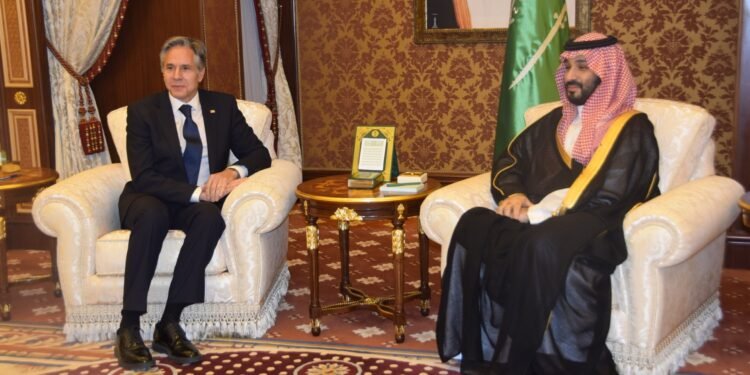Greece (Brussels Morning Newspaper) U.S. Secretary of State Antony Blinken visited Saudi Arabia and met with Saudi Crown Prince Mohammad Bin Salman. This meeting followed a series of high-level security, political, and military consultations between Saudi Arabia and the United States that were held in Riyadh and Jeddah in April and May. Inquiring into Crown Prince Mohammad’s stance on significant issues was Secretary Blinken’s hope.
Their discussion focused on several subjects but it seems that the most serious was the normalization of diplomatic ties between Riyadh and Jerusalem, Crown Prince Mohammad’s relationship with U.S. President Joe Biden, and the regional cooperation of the two countries in Sudan, Yemen, and the Gulf and Red Sea regions security.
President Joe Biden and Riyadh have frequently disagreed over Saudi Arabia’s supply of crude oil to international markets, its readiness to work with Russia in OPEC+, and its efforts to negotiate a settlement with Iran through Chinese mediation. In addition, Biden promised to bring Saudi Arabia to an international/diplomatic “pariah” status for killing Washington Post analyst Jamal Khashoggi in 2018.
Backdoor Communications
Blinken met Prince Mohammed early Wednesday, with State Department saying they discussed their “shared commitment to advance stability, security, and prosperity across the Middle East and beyond.”
Blinken committed to a US-allied Middle East where stability, diplomacy, and dialogue prevail. But in fact, this is already the case. With the US, not between countries. Russia and China, these two countries were on the agenda, and human rights discussions may have taken 30 seconds.
“The secretary also emphasized that our bilateral relationship is strengthened by progress on human rights,” a statement added.
A Saudi statement acknowledged the meeting but offered no specifics.
The recent evacuation of US citizens from war-torn Sudan and Saudi Arabia’s diplomatic efforts to end the fighting between rival Sudanese factions were monitored in part by Saudi Arabia, who was thanked by Blinken for its support. He also emphasized that progress on human rights had strengthened bilateral relations between Washington and Riyadh.
For a long time, US-Saudi relations appeared frozen for a number of reasons. Μaybe this was never the reality. How improbable is the fact that Saudi Arabia feigned bad relations with the United States in order to keep a diplomatic channel of communication with the Kremlin and Beijing? How likely is it that relations between the Prince and President Biden “cooled” so much that the Prince “defected” to Putin and sacrificed a decades-old geopolitical alliance and a huge market of weapons systems?
During their recent visit to Saudi Arabia (13–14 April 2023), US National Security Council (NSC) coordinators for the Middle East and North Africa (Brett Mcgurk and Amos Hochstein) met with Prince Faisal Bin Farhan Al Saud, Minister of Foreign Affairs, and Crown Prince Mohammad Bin Salman Bin Abdulaziz. According to reports, the visit demonstrated how highly regarded McGurk is in Saudi Arabia.
Oil and more
The Biden administration doesn’t have any immediate concerns during the summer driving season because oil prices are well below $100 a barrel. As relations with China and Russia improve, Washington undoubtedly hopes to take advantage of its security partnership with Saudi Arabia. However, the Saudis probably desire assurances that Biden cannot deliver on Congress’ decision to halt military supplies to the country.
Despite prisoner exchanges and attempts to put an end to the civil war that affects regional stability, the Yemen tragedy persists. Both parties probably have political and diplomatic agendas that they won’t get in the meanwhile. Spinning centrifuges open the way to a potential weapons program, which worries nonproliferation specialists. Saudi Arabia has advocated for a nuclear partnership that includes America allowing it to enrich uranium in the country.
Despite Saudi Arabia’s neighbors Bahrain and the United Arab Emirates diplomatically recognizing Israel in 2020, it currently seems an imaginary scenario that Saudi Arabia will do the same.
King Salman of Saudi Arabia has consistently advocated internationally pushing Israel to sign the establishment of a Palestinian state in the occupied West Bank, Gaza Strip, and East Jerusalem, which Israel annexed after the 1967 Middle East conflict. However, given the increased violence and tensions in the country and the fact that Israeli Prime Minister Benjamin Netanyahu now leads the most right-wing and religious administration in its history, such a step is incredibly unlikely.
Concluding a treaty between Israel and Saudi Arabia would be a huge diplomatic success for the US. Which they would need in terms of communication. But THE issue is why should they give it away so easily or not exchange it for something that would have an impact on the Middle East.




